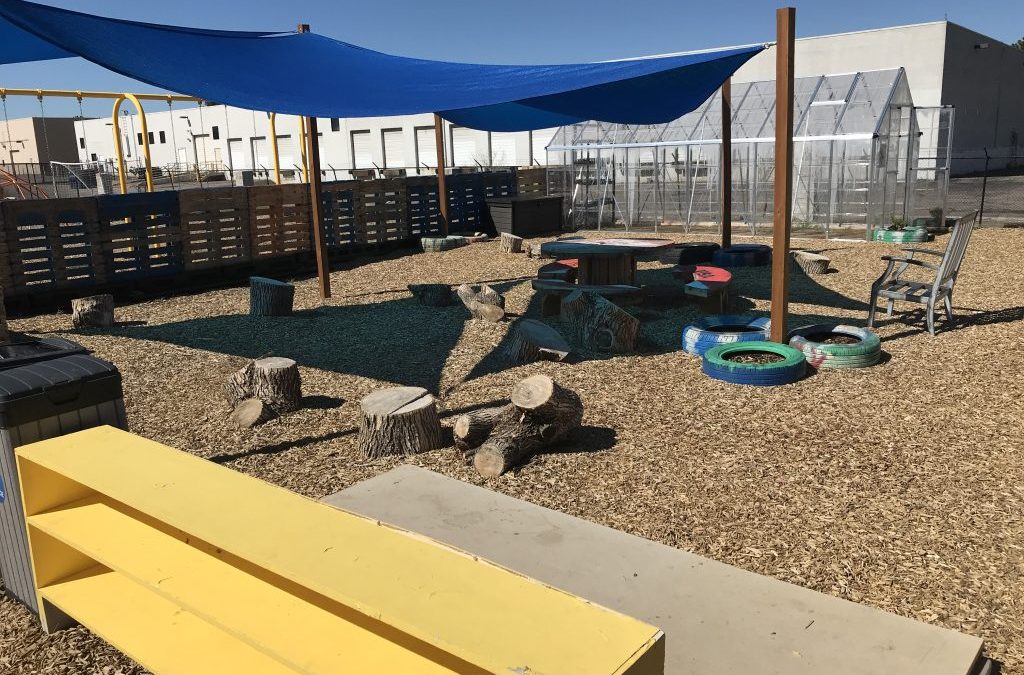By Melanie Stewart-Lopes
Monarch Montessori of Denver is two schools under one roof. First Steps at Monarch Montessori of Denver is the infant through preschool program that is a private, non-profit school and the elementary school is a public charter school through Denver Public Schools. Monarch is located in northeast Denver in the Montbello community and lies within a food desert. In 2019, First Steps at Monarch applied to join the network of school gardens in Montbello through a grant provided by the Montbello Organizing Committee Freshlo initiative. The intention of the gardens is to educate the students and staff about fresh grown produce and to feed our school community. It has been joyful to share with the children the process of growing from seed all the way to collecting seeds for the next season.
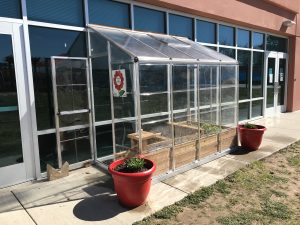
One of two greenhouse for seed starting and year round food production
Although there was a late start to the growing season in 2020, Monarch proudly produced over 70 pounds of produce in just 10 garden beds in the First Steps garden. Water access was a hurdle for the garden success so alternatives were explored. The preschool kids learned of an ancient watering system originally from China and North Africa utilizing ollas to water the gardens. Ollas are round terracotta pots that when filled with water; provide roots direct access to the water with less water evaporation versus surface watering. The kids would have 2-liter water bottles brought to the garden to place on the modernized version. The kids would marvel at the water gurgling into the pipes fitted to direct the water to the terracotta flowers pots turned into ollas. Learn to make yours here.
This year, Monarch has expanded the gardens to the elementary side of the property. Monarch boasts four separate areas for gardening. There are two dedicated vegetable gardens, a fruit garden and a sensory garden. At the entrance of the First Steps playground is the Sensory Garden with three distinct areas including taste, smell and touch. The taste section of the sensory garden includes many herbs that can be used with the vegetables grown in the other gardens. The center section is all about the sense of smell. As the young students walk the path to the playground they have the opportunity to have their sense of smell tantalized with tires filled with sage, catmint, lavender, and lemon balm with an arbor at the entrance, soon to be covered with sweet honeysuckle. The last sensory section is dedicated to touch and includes soft, rubbery, and spiky options for students to gently engage.
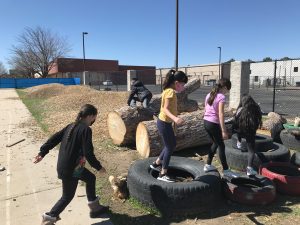
Monarch students enjoy the natural and non-traditional play materials
With the installation of a giant chess board this last year for the kids to learn and challenge each other, Monarch will be surrounding the game board with a sweet fruit garden, as well as two toddler maintained vegetable garden beds and a pumpkin/squash patch. Adjacent to the fruit garden is the fruit orchard featuring Honey Crisp, Arkansas Black and Green apple trees, peach trees, a cherry tree, a grafted pear tree with two varieties of pears and Chicago Hardy Fig trees. Additionally there are grapes with plans for blackberries and raspberries next season.
The gardens are situated within the outdoor classrooms so students are immersed in vegetation that can positively affect the children and teachers. Since Monarch is located within a food desert, we want children to think of these fruits and vegetables as “real” food that makes them feel good when they eat it. We were the first school to have a permanent solar oven installed by Open Energi, a non-profit that is educating children on clean energy use. The kids have been making cookies, kale chips, sweet potato chips and corn bread in our new oven. The best part of the solar oven is that Colorado is so sunny year around that cooking can happen even on a 25 degree morning!
In the last year, Monarch also received two greenhouses so that we can extend the growing season. Grant funds from the FreshLo initiative purchased a small lean-to greenhouse that students can observe winter vegetables growing from the inside of the gym. The second, larger greenhouse was purchased by the DPS Foundation grant and built by volunteers from JE Dunn Construction. On Earth Day, we held a naming ceremony for both of the greenhouses. The preschoolers named the small greenhouse, “The Tiny Seed Greenhouse” inspired from the Eric Carle book. The elementary named the large greenhouse, “Rose” inspired by the beauty of a rose.
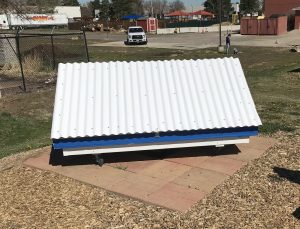
The solar oven installation can rotate to optimize sun exposure and has a locking lid for safety
In addition to the gardens, the 5 acre property allowed Monarch the space to develop a ½ mile nature trail called the Peace Path that classrooms can engage with native Colorado plants, insects and animals. The path is named in honor of Maria Montessori who believed the path to peace is through educating children.
The outdoor and garden work is led by Melanie Stewart-Lopes, Marketing and Operations Manager and is supported with an amazing team of parent and staff volunteers. Melanie began with Monarch’s inception in 2010 and left for the corporate world for a few years. Wanting to go back to non-profit education, she returned, managing marketing, enrollment and facilities in 2019. Melanie has a BFA in graphic design and uses her love of design and gardening to drive the outdoor spaces into a fun and visually engaging space that children will love and respect. She designed a logo to brand the urban gardens and outdoor learning spaces to elevate the importance of this educational feature for Monarch. The Montessori method is all about connecting children with nature and understanding the hows and whys of the world. Melanie’s goal is to get the children outside to have more opportunities for that nature exploration.
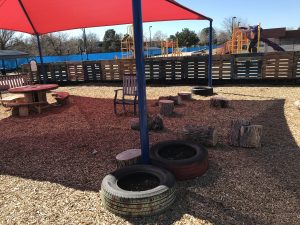
One of four new outdoor classroom areas at Monarch
Monarch Montessori is so grateful for the opportunity to have these beautiful gardens and to teach the next generation to respect the gifts of the earth and to nourish their bodies with healthy food that they grew themselves. The joy watching the children observe growth and collect the food is amazing. We hope that they take these skills home to begin their own gardens for their families and seek out healthier food options that make them feel good.

